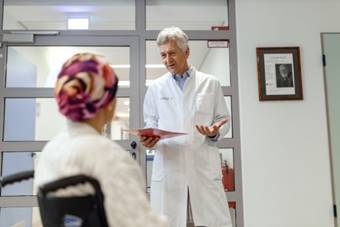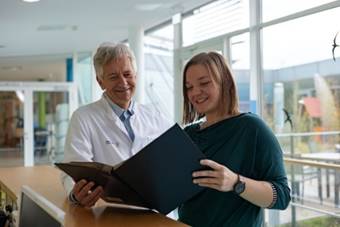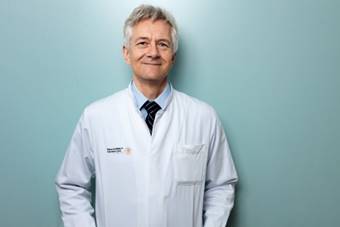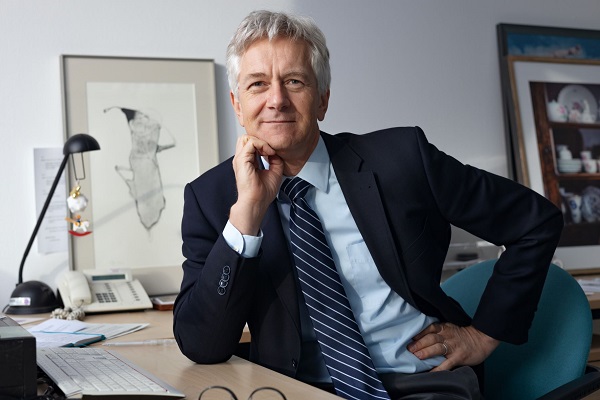First DKMS clinical trial improves therapy for blood cancer patients.
- Faster transplantation
- Less drug-related side effects
- Reduced treatment costs
Date, 4, 2023 – February 4, 2023 is World Cancer day, which focuses on the prevention, research and treatment of cancer. The first ever completed clinical trial facilitated and organized by DKMS that may be practice changing for patients suffering from AML (acute myeloid leukemia). Patients in urgent need of a stem cell transplant could be transplanted much faster – and benefit from shorter hospital stays as well as fewer side effects by not having to undergo lengthy high-dose chemotherapy.
This important conclusion was reached by the researchers at the University Hospital Carl Gustav Carus Dresden, the National Center for Tumor Diseases Dresden (NCT/UCC), and the University Hospital Münster (Germany). The trial was supported by the Study Alliance Leukemia (SAL), the Cooperative German Transplant Study Group, and the Gert and Susanna Mayer Foundation.
The ASAP study was a Germany-wide randomized controlled trial in which 18 clinics participated. The goal was to get AML patients to stem cell transplantation as soon as possible without requiring complete remission before allogeneic stem cell transplantation. Attempting complete remission prior to transplantation has been considered the standard of care. “The surprising finding of the clinical trial was that patients did not benefit from a full course of chemotherapy prior to transplantation to induce complete remission. Rather the study suggests, that if a matched donor is available, 12 days of preparatory chemotherapy followed by immediate transplantation yields comparable treatment outcomes with fewer side effects and shorter hospital stays”, summarizes Prof. Dr. Johannes Schetelig who heads the Clinical Trials Unit of DKMS as well as the Stem Cell Transplantation Unit at the University Hospital Carl Gustav Carus Dresden, Germany.
Patients worldwide can benefit
If the results are translated into clinical practice, numerous patients worldwide may benefit in the future, as patients who urgently need a stem cell transplant could be transplanted much faster – without the stressful phase of salvage chemotherapy and long hospital stays. Even with intensive chemotherapy, the previously targeted complete remission can only be achieved in about 50 percent of patients. If the corresponding treatment is unsuccessful, most patients have so far received further anti-leukemic drugs with potentially burdensome side effects, depending on their overall state of health. Immediate transplantation could also allow more patients access to this potentially life-saving treatment.
The results of the ASAP trial demonstrate that AML patients will have the same chances of cure in the future without having to be hospitalized longer than necessary and the cost of therapy will be significantly lower.
Why is it important that DKMS as a non-profit organization funds clinical research?
“It is our declared goal to improve the survival of people with blood cancer. To achieve this, it is essential to continuously develop existing forms of treatment and to constantly explore new approaches in blood cancer therapy. To fulfill our life-saving mission, we invest in science and research: with success, less side effects and hospital stays with equally good treatment results,” highlights Elke Neujahr, Global CEO DKMS.
DKMS is an economically operating non-profit organization and its revenues go to social or scientific purposes. This way, the organization is able to financially support meaningful projects that help blood cancer patients around the world. “Often, sponsors of clinical research pursue economic interests. It is therefore less common to conduct a clinical trial that challenges a standard medical intervention than to investigate new therapeutic approaches. That’s why it’s necessary for non-profit organizations like DKMS to also conduct clinical research. This way, we can help ensure that patients receive the best possible treatment and that we actually advance patient care,” says Dr. Alexander Schmidt, Global Chief Medical Officer at DKMS.
The organization also employs a wide range of programs and services to improve the access to transplantation for patients in low- and middle-income countries who would otherwise not receive treatment. For example, DKMS provides free HLA typing to identify family donors and funds stem cell transplantation for children with thalassemia in India to lessen the burden for patients and their families. The organization has also funded a transplant station in Bangalore where up to 120 children annually get their second chance at life. In Poland, DKMS is helping to ensure that hospitals are better equipped to treat leukemia patients. And in Chile, the lack of resources and infrastructure are main barriers for blood stem cell transplantation. There, the organization supports patients and the healthcare system so that more people can receive life-saving treatment.
Details about the study and the link to the publication can be found here.
Would you like to learn more about our commitment to medicine and research? Then visit our DKMS Professionals’ Platform.
Publication:
- Stelljeset. al.: In Patients with Relapsed/Refractory AML Sequential Conditioning and Immediate Allogeneic Stem Cell Transplantation (allo-HCT) Results in Similar Overall and Leukemia-Free Survival Compared to Intensive Remission Induction Chemotherapy Followed By Allo-HCT: Results from the Randomized Phase III ASAP Trial. Blood (2022) 140 (Supplement 1): 9-11.https://doi.org/10.1182/blood-2022-159962
Videos:
- https://vimeo.com/dkmsglobal/asapengut (long version)
- https://vimeo.com/dkmsglobal/asapengshort1sub (short version)
“Patients did not benefit from a full course of chemotherapy prior to transplantation,” Prof. Dr. Johannes Schetelig explains why the results of the ASAP-trial are a good message for patients.
Photographs:
Caption: Prof. Dr. Johannes Schetelig heads the Clinical Trials Unit of DKMS as well as the Stem Cell Transplantation Unit at the University Hospital Carl Gustav Carus Dresden, Germany. © Tobias Ebert for DKMS

Caption: The DKMS Clinical Trials Unit was founded in 2013 by the stem cell donor center DKMS. Its goal is to advance medical and scientific progress in the field of blood cancer therapy in order to continuously improve the survival and chances of recovery of blood cancer patients. From left to right: Prof. Dr. Johannes Schetelig, Head of the DKMS Clinical Trials Unit (CTU) and Head of the Stem Cell Transplantation Unit at the University Hospital Carl Gustav Carus Dresden; Sarah Trost, Team Leader Clinical Trials of the CTU.© Tobias Ebert for DKMS

Caption: The ASAP trial challenges international therapy standards: Many of the patients who urgently need a stem cell transplant could be transplanted much faster – without the burdensome phase of prolonged high-dose chemotherapy and long hospital stays. If the results are transferred into clinical practice, numerous patients worldwide will benefit in the future. Prof. Dr. Johannes Schetelig (r.) heads the DKMS Clinical Trials Unit and the Stem Cell Transplantation Unit at the University Hospital Carl Gustav Carus Dresden.© Tobias Ebert for DKMS

Note on the use of images for press releases:
The image and video material provided is intended exclusively for journalists and employees of media companies as a source for their own editorial reporting on the subject of the press release. It is not intended for commercial use, in particular not for advertising. The transfer of image, audio and video data to unauthorized third parties is not permitted or is only possible after consultation with the DKMS press office (+49 221 94 05 82-3333).
Press contact: Please add your contact details here
DKMS gemeinnützige GmbH – Global Corporate Communications – Julia Schmitz –
T +49 (0)221 940582 3241 – jschmitz@dkms.de, https://professional.dkms.org/ .
About DKMS
DKMS is an international non-profit organization dedicated to saving the lives of patients with blood cancer. Founded in Germany in 1991 by Dr. Peter Harf, DKMS and the organization’s 1,000 employees have since relentlessly pursued the aim of giving as many patients as possible a second chance at life. With over 11,5 million registered donors, DKMS has succeeded in doing this more than 100,000 times to date by providing blood stem cell donations to those in need. This accomplishment has led to DKMS becoming the global leader in the facilitation of unrelated blood stem cell transplants. The organization has offices in Germany, the US, Poland, the UK, Chile and South Africa. In India, DKMS has founded the joint venture DKMS-BMST together with the Bangalore Medical Services Trust. International expansion and collaboration are key to helping patients worldwide because, like the organization itself, blood cancer knows no borders.
DKMS is also heavily involved in the fields of medicine and science, with its own research unit focused on continually improving the survival and recovery rate of patients. In its high-performance laboratory, the DKMS Life Science Lab, the organization sets worldwide standards in the typing of potential blood stem cell donors.



